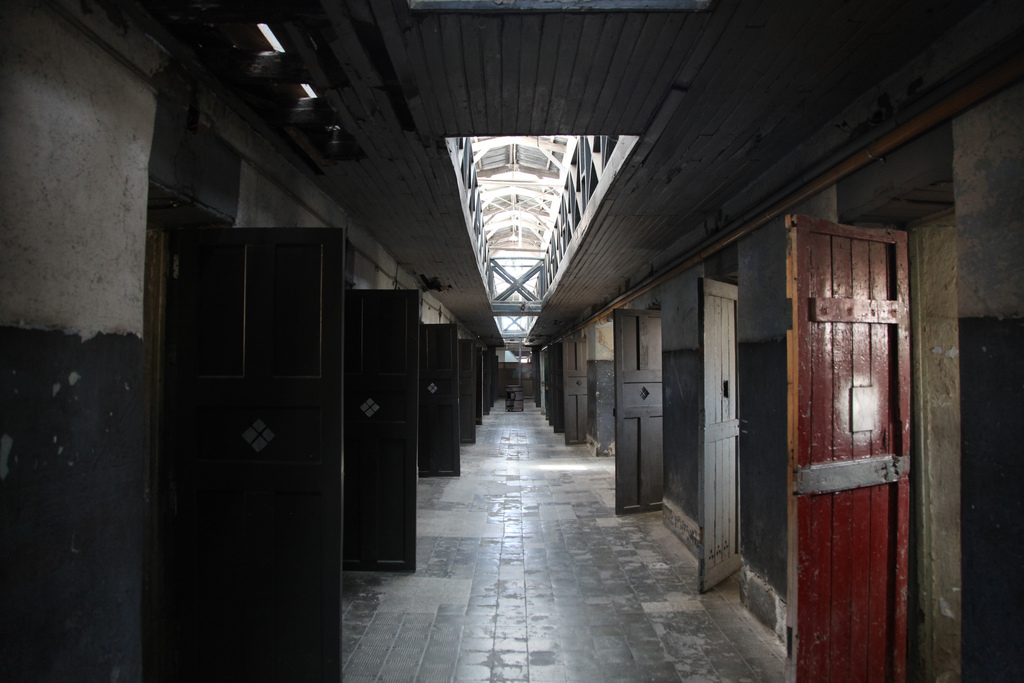
A corridor at the End of the World prison in Ushuaia in the Argentine region of Tierra del Fuego. Closed in 1947, the prison is now a museum.
Photo by Liam Quinn (CC BY-SA 2.0)
I recently experienced great surprise and shock when I read in the news that the Federal Court of Criminal Appeal in my country, Argentina, had upheld a habeas corpus petition filed by the Public Defender Official and Procurator's Office of the Nation, requesting that inmates enjoy the same labor rights as all other workers.
The first question that came into my mind was: why should people who have committed crimes receive salaries, vacations and social benefits? How does that idea square with the notion that they should pay for their crimes? Lawmakers in the Netherlands, for instance, have proposed that prison inmates should be charged rent for the time they spend behind bars. What key aspect of the Argentinian court's decision did I not understand?
So I decided to read and investigate what is going on in Argentina and what others were saying.
Leandro Halperin, a specialist in human rights and penal policy justifies the measure [es], noting that the principal employer of prisoners is not the state, but the private sector. “If we don't do this,” Halperin is quoted as saying. “the future will be more complicated. Prisoners are not hired to provide a service to the community, they're hired because it is cheaper. But these are also opportunities that help prisoners them not to re-offend.”
Halperin has a point: if there were no laws protecting work carried out in prison, the private sector could exploit that. Work done by prison inmates is, however, protected under Article 107 of Argentina's labor law. But I still found the situation difficult to understand, as the minimum wage is higher than the retirement pension rate. That means that a prison inmate would get vacations, social benefits, salary, while someone who has worked all his life would receive lower benefits than someone who committed a crime.
To be paid for work is nevertheless a human right, otherwise it would be classed as slavery. Atrapamuros (Behind the walls) is a blog that aims to highlight the reality of life in prison, and this post cleared up some of the doubts I had: it reminded me that when a person goes to jail they might lose their freedom, but they don't lose the right of access to education, labor, health or contact with their families.
I wasn't the only person to leap to judgement before analyzing and reading a little bit further. Twitter and other social media reflected some anger with the law:
DERECHOS PARA PRESOS Y NUEVOS DELITOS: Secuestro seguido de vacaciones y Violación seguida de aguinaldo.
— FEUDO #24 (@feudo24) diciembre 2, 2014
Dejen de boludear con eso que las cárceles están para resocializar. Para ello están las organizaciones de la sociedad. Quien delinque: paga.
— ROBERTO D SURIANI (@rdsuriani) diciembre 4, 2014
#PresosConAguinaldo NOOOOOOO ESTAMOS TODOS LOCOS? Y LOS JUBILADOS? Y LA GENTE QUE TRABAJA Y COBRA MENOS DE 2000 PESOS? DÉJENSE DE JODER
Article 14 of the Argentine constitution states that all residents of the nation have the following rights: to work or carry out any lawful business or trade, etc. So why all the judgments regarding prisoners rights? Extending certain rights to prison inmates can be a difficult idea to digest, especially for those who have lost loved ones at the hands of a criminal. But prisoners are indeed human, and is about time that countries’ legal systems and human rights bodies call upon them to extend constitutional rights to everyone.
Resocialization of those who have committed crimes is a must, for if you deprive someone of their rights while in prison, it will be difficult for them to re-enter society and the end of their term.








1 comment